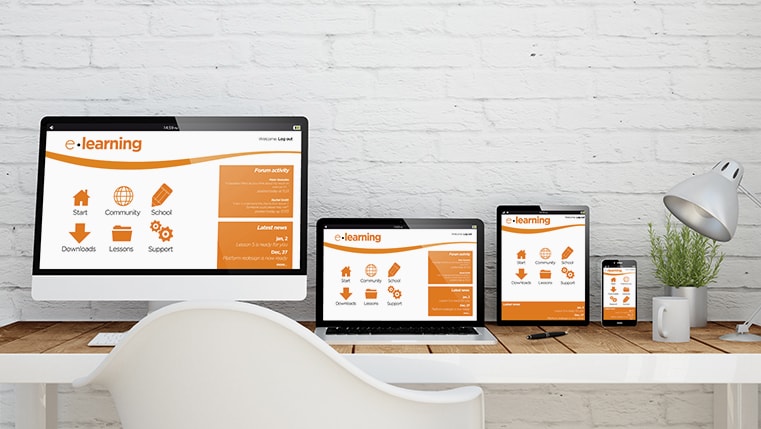Lectora for Rapid eLearning: 4 Amazing Features

Numerous organizations rely on rapid authoring tools to speed-up the training process and cut down the costs. In 2019, the world is moving at a faster pace than ever, with access to learning content literally in the hands of the learner i.e., mobile-friendly learning courses. Most traditional authoring tools offer outdated features – Adobe Flash’s lack of support for mobile is a great example – that may not sit well with today’s learning demands. To make sure that these learning needs are fulfilled, modern and learner-friendly tools such as Lectora Inspire must be used. In this blog post, I am going to tell you four reasons Lectora is the right choice for rapid custom eLearning development.
4 reasons to use Lectora for rapid eLearning development
- For Flash to HTML5 conversion
- For on-the-application through scenario-based learning
- For a wide variety of eLearning assessments
- For seamless multilingual training
1. Not Flash, HTML5 is the Future of E-learning
In the face of a rapidly-changing corporate landscape and the increasingly demanding learning needs of learners, Flash has been unable to keep up. Lack of support for learning needs such as access to training content on smart devices is one of the many reasons Flash has fallen out of favour. So, if an organization has a repository of training created using Flash, it is time they are converted to HTML5-based courses which – unlike Flash – deliver device-independent learning and work across all modern browsers.
Lectora Inspire was one of the first tools that offered HTML5 support for rapid custom eLearning courses. It handles Flash-to-HTML5 conversions with ease, by means of the tool’s Responsive Course Design (RCD) feature which enables courseware designers to resize and orient the course elements to match the screen size or dimensions of various different devices. This means that learners can access training content regardless of the device they are accessing it on, without having to worry about time-consuming, desktop-ridden training sessions.
2. Learners Learn Better through Real World Scenarios
Learning without context is no learning. Scenario-based learning is a learner-centric strategy that essentially immerses a learner in context-driven scenarios that reflect the real-world obstacles and problems they will face in their workplace environments. Scenarios allow learners to acquire skills that are directly useful for their jobs, helping them register the content in the long-term memory for future use. These scenarios are created by experienced instructional designers who bring their years of expertise in domain and industry-specific knowledge to tailor effective and meaningful scenarios for the learners.
With Lectora Inspire, designers can make branching scenarios, taking fun a notch ahead in the context of learning. A branching scenario is almost like a choose-your-own-adventure strategy, where every decision a learner makes in the beginning impacts where they end up and what their options are. These types of scenarios induce fun and keep the learner hooked to the learning process, all the while expecting learners to use all their resources to solve the problem or overcome the obstacle.
3. Knowledge Tests Can Be Fun with E-learning Assessments
Evaluating learners on their learning is essential; because it is only through assessments that learners can measure how much of the training they have understood. It is a device to help learners reflect on the information they have been exposed to. One of the ways of doing this is by either having knowledge tests during the course (aka formative assessments) or at the end of the course (aka summative assessments) providing feedback at every turn.
When using Lectora Inspire for creating rapid custom eLearning, designers can make use of the nine different assessment types that Lectora offers including MCQs, True/False, Drag and Drop among others. These assessments are trackable i.e., SCORM-based eLearning assessments which, when hosted on a learning management system (LMS), can be useful to track learner activity such as completion of courses. Apart from tracking, organizations can generate reports based on the assessments to calculate the effectiveness of the training program.
4. Training Offered in a Learner’s Native Language is a Must
One of the important problems that multinational organizations face when they venture into foreign markets is imparting effective training to their international staff that speaks several languages. To offer consistent training to a globally-spread workforce, eLearning content translations is a must and the process is carried out by an experienced eLearning translator. Learners must be given the control to choose their native language or any language they are comfortable with while taking the training.
With Lectora’s Translation Tool option, courseware designers can offer learners a multilingual interface in the course, enabling them to switch between languages at any point while accessing the course, without having to restart the course.
No doubt Lectora offers robust features that can easily fulfil the modern learning needs. However, it stands to reason that no rapid authoring tool is rewarding without the expertise that is needed to make the most out of the tool. Courseware and instructional designers understand learning and design inside out, and they have the knowledge and experience to use the tool in conjunction with the content that is at hand, to make the development of rapid custom eLearning a success. Want to know more about rapid custom eLearning? Download this eBook that has the answers.



![4 Amazing Features of Lectora Inspire for Rapid E-learning [Infographic]](https://blog.commlabindia.com/hubfs/Imported_Blog_Media/lectora-inspire-rapid-elearning-infographic-1.jpg)

